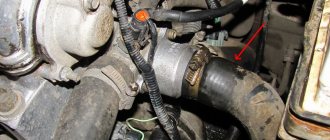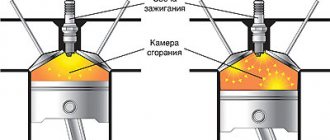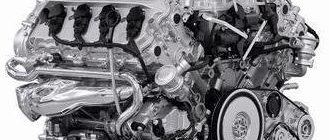For many drivers, a contract engine is a good alternative to a faulty engine, the repair of which entails significant costs.
In most cases, engine overhaul does not bring 100% results. Although the engine becomes operational after such repairs, its further service life is significantly reduced, fuel consumption, as a rule, increases, and the reliability of the engine also decreases.
You also need to understand that the quality of complex engine repairs at our car services, to put it mildly, often does not correspond to what was declared, especially when it comes to foreign cars, since finding a highly qualified specialist for this type of repair is not so easy.
Therefore, many drivers use a contract engine to replace an already worn out or faulty engine.
What is a contract engine?
A contract engine is an engine that is installed to replace an old or failed engine in a car of the same model on which it was installed, or in a car to which it is suitable in terms of its technical and operational characteristics.
Requirements for a contract engine:
- It must only be removed from an old car legally;
- It must be fully working;
- Availability of all attachments;
- To install it, you need a competent specialist who can adjust and configure the operation of the attachment and connect the engine to the vehicle’s electrical network.
Where do these engines come from?
If in the countries of the former post-Soviet space cars are used until the last minute, until they begin to fall apart while driving, then in foreign countries, you are unlikely to be able to drive such a car even for several blocks; you will definitely be stopped, at best, for the first time, and fined.
In European countries, Japan, the USA and even in China, the standard of living allows people to often exchange even 5-year-old cars for new ones. And even after a minor accident, people prefer to simply buy a new car rather than repair it.
As a rule, used cars are resold abroad in other countries, and cars that require repair, depending on the severity of the problem, are repaired and also resold, or dismantled for parts, while removing completely working units, assemblies and parts, including the engine . This engine, if it is in full working order, is called contract.
Taking into account the service life of engines produced abroad, installing a contract engine with a still short service life will allow you to acquire an almost new engine for an acceptable amount, while the car service center where you installed such a “device” can give you a guarantee for its operation for up to 6 years months (not everywhere).
For example, you installed a contract engine with a mileage of 150,000 km. The operating life of the engine installed on foreign cars is 1,000,000 or 500,000 km, so calculate how long it will serve you.
Contract engines from Europe
Cars in Europe are operated, one might say, in ideal conditions.
Thanks to excellent roads, the operating conditions of their engines never exceed standard limits. A moderate climate without severe cold does not require frequent warming up of the engine, which also affects its service life.
European quality of fuel and engine oil also has a positive effect on the excellent condition of engines.
Also in Europe, car owners take timely maintenance very seriously, since if you violate the date of the next service, you can automatically lose the car’s warranty.
The only thing you need to pay attention to is the engines, which can be removed from drowned cars. But a self-respecting company that has been on the market for a long time will never offer you such engines. And there’s a lot of fuss with such motors; it’s easier to immediately send them for scrap.
POPULAR WITH READERS: How an engine overhaul is carried out, stages of work
Particularly popular among contract engines from Europe are engines taken from BMW, Opel, Volkswagen, and Audi cars.
The service life of such engines, as noted above, can be up to 1,000,000 km, and German quality has always been at its best, especially when it comes to engines.
Engine repair or complete replacement
Let's start with the fact that you need to consider whether the repair is planned or the breakdown occurred unexpectedly. In the case of scheduled repairs, we can talk about the natural wear and tear of the internal combustion engine, which inevitably leads to “capital damage”. Typically, significant wear is indicated by a decrease in power, an increase in fuel and oil consumption, the appearance of an oily bluish exhaust, etc. Compression in the cylinders decreases, wear of the CPG and other elements is noted.
As for unscheduled repairs, problems can arise as a result of a broken timing belt, water hammer, overheating, or oil starvation. The engine may also be damaged after an accident. One way or another, at the initial stage, in many cases the engine needs to be disassembled and troubleshooting carried out.
For an initial inspection, it is often enough to remove the cylinder head and oil pan. After removing the head, you can notice possible damage to the pistons, scuffing in the cylinders, etc. Copious dirt and deposits may be visible in the pan; metal shavings are often visible in the oil. These signs clearly indicate the general condition of the engine.
Based on the data received, the owner decides whether to install new parts and repair the unit or immediately purchase another motor. Usually, the choice of one solution or another is greatly complicated by the fact that the announced preliminary amounts for repairs can be even higher than the cost of the contract unit.
Advantages and disadvantages of overhaul
As a rule, as part of a comprehensive repair, all worn or damaged parts must be restored and replaced. The main task of the overhaul is to return the engine to full performance and bring its performance characteristics and service life closer to factory parameters and indicators.
In this case, pistons and piston rings are subject to replacement, the cylinder block is lined or bored, the cylinder head is rebuilt, the crankshaft is ground, the connecting rod and main bearings are changed, etc. Naturally, the volume of such work and the need to purchase expensive spare parts will require significant financial costs. However, a well-repaired internal combustion engine will not need to be opened again for hundreds of thousands of kilometers, provided proper maintenance and proper operation.
Let us also add that breakdowns such as cracks in the BC or cylinder head, increased oil consumption, decreased compression and other malfunctions do not necessarily indicate the need for major repairs. The problem can be solved by replacing the piston rings, valve stem seals, and valves. In some cases, cracks can also be welded.
Let's get back to the overhaul. It turns out that after this procedure the engine is completely restored, all parameters are as close as possible to the factory settings for the new engine. Troubleshooting reveals all weak points, which eliminates even minor problems such as leaking seals or gaskets.
Simply put, a well-made “capital” actually means that the owner receives a new engine. Another important feature is that the engine number does not change. This means that legal problems are completely excluded. The only downside is the time and money costs.
Pros and cons of a contract engine
Typically, the decision to purchase a contract motor is attractive due to its simplicity, speed and, often, reasonable price. The fact is that such an engine can be easily selected and completely replaced at a service center in 1-2 days. If the existing motor cannot be restored, then the choice in favor of replacing it is obvious. However, in other possible cases, the main advantages are not so obvious.
- First of all, a contract engine is a used engine. This means that there is no point in excluding various malfunctions or significant wear of such a unit.
- You also need to make sure that the purchased internal combustion engine is fully suitable for installation on a specific car model.
- Another important feature is the need to register a new engine. For official registration, you will need to provide the necessary certificates about the legality of the unit itself, its legal acquisition, etc.
For these reasons, it becomes clear that without proper experience, it is better for the car owner to refuse to try to buy a contract motor. This means that you will need to work with an intermediary or a large supplier. In this case, you should also be prepared for the fact that the price of the engine will be noticeably higher than that of small private owners.
Large suppliers usually bring motors from abroad. Most internal combustion engines are from Japan; units for European car models are less common. As for small dealers, usually such individuals do not sell imported engines, but engines from local scrapyards. As a rule, with the question of selecting a contract unit, it is better to contact the management of the service station where the engine replacement will be carried out. The fact is that car services usually work with reliable partners who provide any guarantees.
We also recommend reading the article about what engine overhaul is. From this article you will learn about what work is carried out as part of such repairs, as well as how engine overhaul differs from power unit overhaul.
If a contract engine is purchased from a trusted seller, then there is a much greater chance that such a motor is technically sound and in good working order. It happens that along with the unit, real data is even provided about the mileage and service history of the car, where the power unit was removed from for sale.
As for independent selection and purchase, especially at the most affordable price, it is quite obvious that the risk of purchasing a problematic motor is much higher. We should not forget that the purchase of the unit must be documented and properly executed for subsequent registration of the engine replacement.
As can be seen from all of the above and after a detailed study of the issue, there are not many obvious reasons for abandoning capital in order to install a contract unit.
- serious damage to an existing internal combustion engine;
- difficulties with the selection and purchase of spare parts for major repairs;
- selection of parts for an old or very rare engine;
- lack of specialists and significant complexity of repairs;
- extremely high price for unit overhaul;
- desire to swap the engine as part of tuning and replace it with a more powerful analogue;
Choosing a Japanese contract engine
In Japan, it takes approximately 3 to 5 years for owners to update their cars. It is generally not customary to buy used cars in Japan, unless they buy them for spare parts for the purpose of resale in different countries, including ours.
However, if you want to install a contract engine on your Japanese car, then do not rush to do it. The saying “Measure twice, cut once” is very important here.
The fact is that Japanese engines are constantly being improved, new design changes are periodically introduced into them, and they can be produced for different markets, Asian, European, Russian, and so on.
Even two seemingly identical engines, having the same name, but released for different markets at different times, can differ.
Therefore, it is very important to know what year of manufacture your car is, what model, exactly down to the semicolon.
Contract engines from Japan, which are the most popular, are engines that were previously installed on Toyota, Nissan, Mitsubishi and Mazda cars.
Contract, what's the name?
Many motorists, faced with such a situation, prefer a complete replacement of the unit.
But even in this case, a new motor will be very expensive, so many people choose between a used part from disassembly and a contract engine. What does a contract engine mean and what are the advantages and disadvantages of such a replacement? The concept of a contract engine is relatively new. This category includes power units that were operated outside of Russia and dismantled at specialized service stations abroad. In most cases, the market offers motors from Japan, Korea and China, less often from Europe (they are sold in other countries).
What does contract engine mean? Companies offering these motors work without intermediaries. Their partners are large car auctions and companies involved in vehicle recycling. Therefore, the range includes a large number of different internal combustion engines. Customers are given the opportunity to place a part to order. However, there are certain negative aspects, because the unit still cannot be classified as new.
Methods for purchasing a contract engine
There are two main options for purchasing such motors:
- Deal with this issue yourself;
- Contact a special company.
FIRST METHOD. Suitable for those who understand the design of foreign engines, have the time, money and visas to cross borders with European countries, the USA and Japan.
The market for contract engines in these countries is simply huge. You will lose on the trip, but will save on the purchase, since buying it yourself will be cheaper.
When making a purchase, pay attention to the engine number; do not make any mistakes in it when filling out the accompanying documents, as in the future you will have problems with re-registration of the car.
SECOND METHOD. It will allow you to save time and purchase a contract engine from companies that supply such products from the above countries.
You need to take the choice of such companies seriously, look at how long they have been on the market, what reviews about them on auto forums, whether they provide a guarantee for the operation of the motor after its installation and for what period.
A good company will always help you find the right engine model and give you useful advice on its further operation. You will definitely be shown all the necessary documents for the engine, mileage, year of manufacture, model and number.
And if you want to install a more powerful engine in your car, then you can discuss this issue with a good specialist. These companies take recruitment seriously.
Of course, you will pay more money, but such companies always conduct a full diagnostic of the units in advance, identify faults and eliminate them. They do everything to make the client happy.
After installing the contract engine, you will be able to return it to the company within 14 days, demanding a replacement if problems are identified during operation.
But don’t forget to read the contract, and after the installation is completed, take the work completion certificate with you.
Purchase Features
It is impossible to find out from the documents what mileage the internal combustion engine has and whether it was removed from a damaged vehicle. Therefore, how to choose a contract engine and whether it will serve the maximum life is a difficult question.
Visual inspection of an internal combustion engine in some cases is an effective way to check a contract engine when purchasing, but it cannot be considered reliable.
Most suppliers offer warranties ranging from 10 to 30 days. Considering the installation time of the internal combustion engine, which takes a day or two at most, the remaining time is enough to accurately determine its technical condition.
One of the disadvantages is the years of manufacture of the vehicle. It is very difficult to find units whose production was completed in the mid-90s or early 2000s in decent condition. Therefore, repair work may be the only correct solution. If we are talking about the period starting from 2010, then no problems arise here.
Delivery time and time spent on searching should also be taken into account. Especially if the car is in constant use. Typically, all procedures take from 10 days to a month, but in some cases more. No one will say the exact date, since everything depends on many factors.










